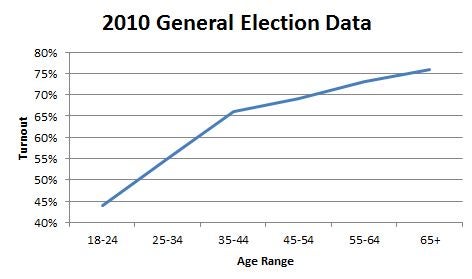Golden oldies? David Cameron favours the elderly because they're the ones who vote
We're in danger of entering a vicious cycle in which the disaffected young don't vote, leaving politicians to favour the old at their cost

David Cameron has been getting some stick recently for the fact that he has largely protected pensioners from the cuts while making no such concessions to people in younger demographics.
His critics are right. There is no real justification for this. Older people should not be exempt from the pain that the rest of society is being asked to endure. State pensions are "triple locked" against the cuts ensuring that they rise by either earnings inflation, prices inflation or 2.5 per cent, whichever is the highest. Free bus passes, free TV licenses and non-means tested winter fuel payments are all dolled out to those in higher age brackets. You only need to look at the reaction to the "granny tax" in the 2012 budget to see how potent older people's finances are as a political issue.
No other section of society sees such largesse. Public sector workers have seen wage freezes or below inflation rises. Those of working age on benefits are now seeing a squeeze for three years on their income. Students are seeing a tripling in their tuition fees. Even child benefit is now being means tested. This represents a clear redistribution of money from younger people to older people. So why is this happening?
The answer is simple.
Old people vote.
Any good economist will tell you how critical incentives are in getting people to behave in a certain way and the Prime Minister is just responding to them. If Cameron clobbers pensioners they are less likely to vote for his party next time around. And because they vote in much greater numbers than younger people this would have a bigger effect on his chances of reelection.
At the 2010 general election, only 44 per cent of those aged 18-24 voted and 55 per cent of those aged 25-34. Contrast this with the 76 per cent of those aged over 65 and you can see how clearly the incentives are aligned.
The solution for people in younger demographics who want to ensure they see policies implemented that are more tailored to their needs is to ensure that they and their peers vote in much higher numbers. It doesn't even matter which party they vote for. The mere fact that they are voting at all would be enough to ensure that all parties sit up, take notice and tailor policies to take account of the new electoral reality.
Disengagement
One of the problems we have at the moment is that because none of the main parties particularly appeal to younger voters, this helps to drive disengagement and to discourage voting. But the more this goes on, the more we end up in a vicious spiral where those who are disaffected by politics because they see it as not relevant to them or actively damaging them (predominantly young people) decline to vote. Thus the incentives for politicians to ignore them and focus on helping older people continues.
To break this cycle, younger members of the electorate need to seize the mantle and shake things up. Imagine how differently the tuition fees policy debacle could have played out if 90 per cent or more of 18 to 34-year-olds had voted in 2010. Suddenly the politicians would have been afraid of offending the younger generation. You can bet your bottom dollar that tripling fees would not have been on the table.
I know it shouldn't be this way. I know that MPs should treat all sections of the electorate fairly and ensure any pain is spread across the generations. But the cold hard fact is that it is this way for a reason. If those in younger demographics continue to vote in such small numbers then they should not be surprised when nothing changes.
It is in their hands.
Join our commenting forum
Join thought-provoking conversations, follow other Independent readers and see their replies
Comments
Bookmark popover
Removed from bookmarks